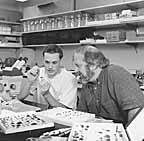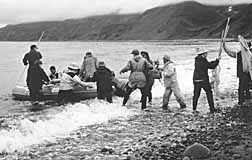
 "That was a great day,"
says biology student Dan Bennett, remembering his first invitation to join
a faculty research project. "I came here because I knew this was a
tremendous school for science, but I had no idea, when I was a freshman,
that faculty encouraged and relied on undergraduates in their
research."
"That was a great day,"
says biology student Dan Bennett, remembering his first invitation to join
a faculty research project. "I came here because I knew this was a
tremendous school for science, but I had no idea, when I was a freshman,
that faculty encouraged and relied on undergraduates in their
research."
Dan has had that experience twice, first in the geology department, then with fisheries professor Ted Pietsch.
Pietsch, a 1998 Distinguished Teaching Award winner, teaches a celebrated course called Biology of Fishes, which uses the evolution of fish to portray for students the whole drama and dynamism of the scientific enterprise. "He's very inspirational, a fantastic person," says Dan, who took the course and was riveted by Pietsch's accounts of summer research expeditions he had been leading since 1995.
 Pietsch had organized a five-year international research project in
biodiversity and won funding for it from the National Science Foundation.
A few undergraduate students, also funded by the grant, could join the
trip each summer. Dan applied and was one of three undergraduates chosen
to participate in 1998.
Pietsch had organized a five-year international research project in
biodiversity and won funding for it from the National Science Foundation.
A few undergraduate students, also funded by the grant, could join the
trip each summer. Dan applied and was one of three undergraduates chosen
to participate in 1998.
Destination: the Kuril Islands, a remote, windswept archipelago stretching from Russia to Japan in the North Pacific. Mission: collecting and cataloguing specimens of the islands' wildlife, before development (now being encouraged by the Russian government) destroys this diverse and unspoiled ecosystem. Colleagues: American, Russian, and Japanese scientists. Headquarters: a Russian research ship from which small boats set out each day to carry researchers to their work on the islands.
Dan, who'd had an interest in bugs since his Quincy boyhood, was assigned to the expedition's insect team. He trained with Pietsch for weeks before the trip.
 The six-week voyage, says Dan, was "life-changing. I went to the
Kurils to find out what it's actually like to be working in the forefront
of this field. I did find out--and it's given me a passion for what
taxonomists do, the discovery part. Each day was such an incredible
adventure. One Russian scientist was even translating books for me. And
Ted makes you really want to do great science--to make him proud of
you."
The six-week voyage, says Dan, was "life-changing. I went to the
Kurils to find out what it's actually like to be working in the forefront
of this field. I did find out--and it's given me a passion for what
taxonomists do, the discovery part. Each day was such an incredible
adventure. One Russian scientist was even translating books for me. And
Ted makes you really want to do great science--to make him proud of
you."
Earlier in the spring, Pietsch had accepted his teaching award with the following words:
"Some 35 years ago, when I was a sophomore at the University of Michigan, I was on probation, with a 1.8 GPA. I thought my life was over. Actually, I think it was my mother who thought my life was over. But one teacher took notice of me. He brought me into his world--gave me space in his lab, introduced me to graduate students and faculty, got me involved in undergraduate research. His lectures were inspiring, but it was the one-on-one tender loving care that made the difference. Through his encouragement and influence, I decided to major in zoology, and the rest is history. To think that I might be doing this for undergraduates at the University of Washington, and that I might be doing it well, is very gratifying."